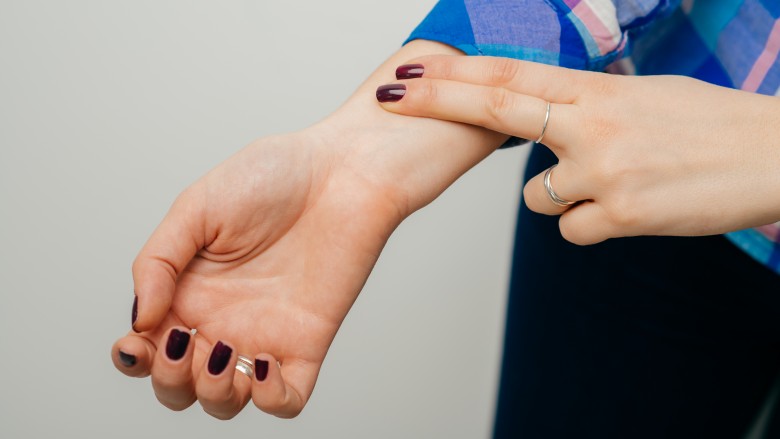What Your Heart Rate Says About Your Health
Your heart is a muscle with an important job — pumping blood throughout your body. The healthier you are, the stronger your heart is, and the less hard it must work to circulate oxygen-rich blood. With that being said, your heart rate actually provides insight into your overall cardiovascular health. According to the Journal of the American College of Cardiology, resting heart rate can be an important predictor of mortality in both men and women — even those without diagnosed cardiovascular disease.
Finding your heart rate
Your resting heart rate is the speed at which your heart beats when you're at rest. Resting heart rates should range between 60 and 100 beats per minute, though this will vary based on a handful of factors, such as your age and physical fitness levels. And there's no need to visit your doctor to find out what yours is — you can take it yourself, in seconds.
Most activity trackers and GPS watches now have heart rate sensors built-in. In fact, in April 2016, the heart rate data provided on one man's Fitbit was credited to saving his life. If you're taking your heart rate manually, the American Heart Association recommends you use the tips of your first two fingers and press lightly over the blood vessels on your wrist. Count your pulse (the number of beats you feel) for 10 seconds, and multiply by that number by six to find your beats per minute. This number is your resting heart rate.
So what does it tell you if that number's on the high side?
You're not exercising enough
Your heart is a muscle and a sedentary, inactive lifestyle can contribute to a weakened heart. A weaker heart works harder to do its job, leading to a higher resting heart rate. Regular physical activity will reduce your risk of heart disease and increase your heart's efficiency. The American Heart Association recommends adults exercise 30 minutes a day, five days a week.
You are stressed out
If your resting heart rate is on the higher end, it may be a result of stress in your life. When you're stressed, your body is working extra hard to prepare for a fight-or-flight situation. This increases your heart rate and makes your heart work harder than it normally needs to. According to the CDC, the negative effects of stress can be linked to cardiovascular disease.
When you decrease the stress in your life, you will find your resting heart rate may decrease, as well. Finding a stress reduction technique that works for you is key, and can be anything from taking a walk, practicing yoga or tai-chi, riding your bike or focusing on your breathing.
You're pregnant
During pregnancy, the amount of blood pumped by the heart increases greatly, pumping the most during the third trimester. Due to the increase in blood volume, your heart rate will also increase — by as much as 15 to 20 beats in the first trimester, and increasing until the end of your pregnancy. By the time your baby arrives, your circulating blood volume will have increased to up to 90 percent above what it was before that positive pregnancy test.
At around 5 months pregnant, I upgraded to a FitBit that monitors my heart rate. From weeks 20 to 37, my heart rate slowly climbed higher and higher and eventually maxed out around 79, at the 37-week mark. (Non-pregnant, my resting heart rate is in the mid-50s.)
What was even more interesting was how quickly my resting heart rate dropped post-partum. In a matter of four weeks, it went from the high 70s to the high 50s. This goes to show you just how hard the body works during pregnancy.
Your medication is affecting your heart rate
Different medications can cause changes in your heart rate. Pam R. Taub, MD, a board-certified cardiologist and associate professor of medicine at the University of California, San Diego, told Prevention Magazine, "Beta blockers and calcium channel blockers are the main ones that can lower a heart rate." Since those meds relax your heart, they also tend to slow it down.
You could have an underlying condition
When disease is present and undiagnosed, a symptom could manifest in an increased heart rate. According to the American Heart Association, a heart rate of more than 100 beats per minute is known as tachycardia. Common medical conditions that will increase your heart rate are anemia, hypertension, hyperthyroidism, and diabetes, to name a few.
If you're feeling under the weather and experiencing an increase in your heart rate, slow it down with extra sleep, homemade chicken soup and some time on the couch. If you still notice an increase in your heart rate, a trip to the doctors should be in store to determine the underlying cause.
You may be feeling seasonal changes
As the seasons change and temperatures fluctuate, you may see a change in your resting heart rate. During the warm summer months, the body needs to work harder to keep your skin cool and maintain your internal temperature. As temperatures and humidity levels increase, you lose more fluid, resulting in a drop in blood pressure and an increased heart rate. Staying hydrated is key to maintaining a healthy heart rate in hot weather.
The same is true in cold winter weather according to the British Heart Foundation. Chilly temps put a strain on the heart to work harder to circulate blood through the constricted blood vessels, resulting in an increased heart rate.
Improving your heart rate
If your heart rate is on the higher end, don't sweat it. Well, you might want to think about hitting the gym! One way to lower your resting heart rate is through exercise. In fact, a study in the Journal of Human Hypertension found that high-intensity workouts are more effective in decreasing resting heart rate than the same duration of lower-intensity exercise.
The CDC tells us cardiovascular disease is one of the leading causes of death in the United States, and research from Harvard Medical School says a high resting heart rate could mean you're at a greater risk for heart problems down the road. Fortunately, your heart is a muscle and with proper exercise, you can make it stronger, and decrease your heart rate thus increasing your overall health.








